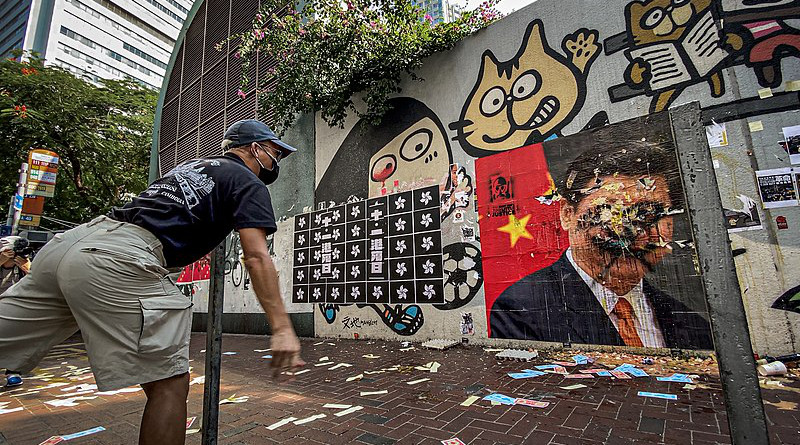Gauging The Fate Of Hong Kong Civil Society – Analysis
By Tai Wei Lim*
The latest round of arrests of pro-democracy activists in Hong Kong signals the death knell for democracy in Hong Kong for Hong Kong’s pro-democracy factions and groups. The national security law — which formed the basis of these arrests — was perceived by Beijing as necessary to restore political stability ahead of Hong Kong’s reversion to China in 2047. Beijing’s next steps are likely to be less radical, coming in the form of pragmatic suasion in the near term, economic integration in the medium term and soft power in the long term.
Suasion emphasising the near-term need for pragmatism comes in the form of well-timed COVID-19 aid. Mainland resources were deployed to build and operate hospitals, isolation centres and testing infrastructure in Hong Kong at a feverish pace. The Chinese government is also helping inoculate residents with the Sinovac vaccine and three other imported options. Hongkongers of all stripes are being encouraged to put aside their ideological differences and pragmatically embrace mainland help during this crisis.
Medium-term economic integration started even earlier. Infrastructure like the Hong Kong–Zhuhai–Macau mega-bridge, West Kowloon Station in Hong Kong (including a border control point where mainland Chinese law applies) and the West Kowloon Cultural District — as well as the influx of ‘red chip’ companies run by mainland entrepreneurs — seek to promote Greater Bay Area regionalism and the integration of Hong Kong into the mainland’s economy. The idea here is that if the differences between Hong Kong and mainland China are eliminated then they will naturally converge.
Suasion and soft power will be applied gradually. For example, public housing is likely to be a longer-term initiative as it takes time to implement a viable, effective policy. Singapore’s public housing system is a blueprint to follow but took decades to develop. It is hoped that implementing an affordable public housing system in Hong Kong with greater connectivity to the mainland’s economy can help Beijing gradually woo Hongkongers and reduce the barriers to convergence of their economies.
China’s long history of sinicising its periphery, along with its time-honoured notion of civilisation in antiquity, reinforce a deep-seated belief that time is on its side.
Whether any space for political reform advocacy will survive in civil society, the media and academia, or whether it is headed toward becoming taboo is unclear. There are three possible paths that Hong Kong civil society may follow.
The first is an adaptation of the Chinese model of incorporating non-government organisations (NGOs) into party organs or at least making them complementary to the Chinese Communist Party’s (CCP) goals. In this way, the CCP can channel NGO resources into commonly-held objectives, including housing for low-income families or environmental protection.
The second possibility is ensuring that foreign funding stays out of NGOs and civil society through legal enforcement. Some non-liberal states in Asia have opted for this route, but it requires state resources and manpower to enforce such a system.
A third and perhaps most difficult model to implement in the Chinese system is the Japanese model of non-profit organisation (NPO) and state collaborations with a high degree of transparency and accountability. NPOs can tap into government funding and resources to expand their projects while taking on additional responsibilities of keeping professional accounts, ensuring high integrity in management of public funds and submitting to checks and balances like media scrutiny or independent audits.
Analogous systems may also apply for the media and academia. For example, having state-owned media, preventing foreign influence in local media and regulating media when national security, social harmony or other forms of cohesion are perceived to be destabilised. In the case of academia, for non- or semi-liberal systems, state-run universities would have to implement some form of compulsory national education and prevent foreign influence, while subversive ideas would also be subject to regulation and ideas of self-censorship.
Democracy activism in Hong Kong, like other anti-establishment movements in modern Chinese history, may be relegated to the exclusive domain of the diaspora. As scores of Hongkongers migrate overseas, some members of these communities may organise ‘Little Hong Kongs’ to form new bases of democracy and network among themselves.
More than a dozen democracy activists have already fled to Taiwan, though some were caught by the China Coast Guard. The United Kingdom will open routes to citizenship for up to 3 million Hongkongers. Australia is also offering paths for skilled migrants and visa extensions. Some, like Hong Kong real estate tycoon Ivan Ko, are proposing a ‘Hong Kong 2.0’ — known as ‘Nextpolis’ — in a site between Dublin and Belfast to accommodate Hongkongers choosing to relocate from Hong Kong for political reasons. Only time will tell whether the fight for democracy can follow Hongkongers abroad.
*About the author: Tai Wei Lim is an Adjunct Senior Research Fellow at the East Asian Institute, National University of Singapore.
Source: This article was published by East Asia Forum

